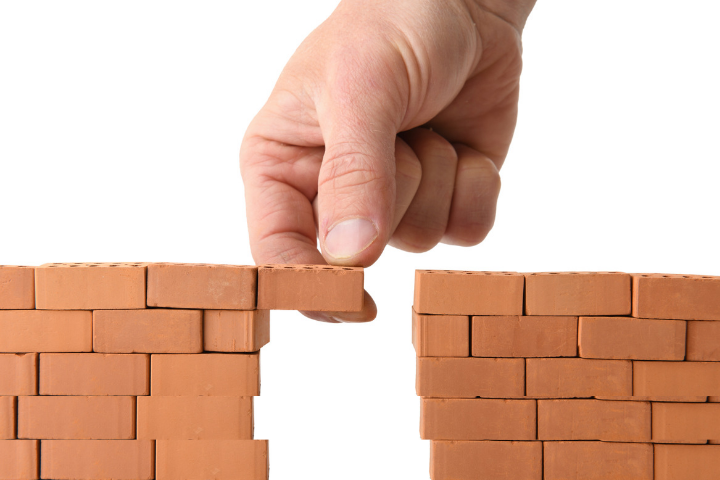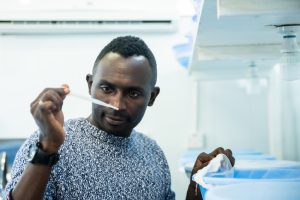Can open access bridge the gaps between science and societal impact?
| 24 October, 2019 | Developers f1000 |

Image credit: roberthyrons
As part of our Open Access Week campaign, we interviewed Dr. Fredros Okumu, Director of Science at Ifakara Health Institute in Tanzania and an Associate Professor at University of Witwatersrand.
Dr. Okumu solely relies on freely accessible research. In this Q&A, he talks about the open access revolution and why only though liberating information and free access to knowledge will we see exponential gains for researchers and the public.

Dr. Fredros Okumu is Director of Science at Ifakara Health Institute in Tanzania, and an Associate Professor at University of the Witwatersrand. He is a mosquito biologist and public health expert working on new ways to improve control and prevention of vector-borne diseases. He is passionate about improving ecosystems for young researchers in Africa and liberation of scientific knowledge. He tweets, occasionally blogs here, and has his publications archived here & here.
Please could you tell us a little about your work
At Ifakara Health Institute, where I currently serve as Director of Science, our mission is primarily to improve people’s health and wellbeing, even though we are mostly in the knowledge industry. To deliver on our mission we must therefore do three things: i) accelerate knowledge sharing between and beyond scientific disciplines, ii) integrate more effectively with communities where we work, and iii) support young people to embrace concepts of knowledge sharing for societal progress rather than individual success.
At a more personal level, I am a mosquito biologist and a public health expert working to improve control and surveillance of mosquito-borne illnesses. My research portfolio currently focuses primarily on dominant malaria vectors in Tanzania. I also have vested interests in expanding access to research findings beyond the research community.
What proportion of the research literature you read is open access?
Everything I read is open access. I decided many years ago that anything behind a paywall is not worth reading. I know that sounds fundamentalist, but I have survived so far. It means for me that 100% of what I read is freely accessed.
I do indeed have a personal mission to accelerate acquisition of new knowledge for health and wellbeing, and this requires dedication to open science philosophy. I understand that primary data must be considered sacrosanct and therefore protected to a certain degree. However, I also believe that synthesized information generated from such primary data, once generalized beyond individuals, should be open access.
I also recognize the economic struggles facing certain knowledge platforms (e.g. journals, newspapers or magazines), but I do not believe that they should have the power to control what gets published and at the same time levy charges on the readers. As it stands, the researchers who generate the knowledge, the people whose data is used, and the people whose taxes underwrite the knowledge industry, are being heavily shortchanged.
How do you see open access as beneficial for African researchers?
Well! Some people may consider this open access wave as a simply incremental gain, but it really is, in many ways, a revolution. As it stands, people who generate the knowledge are rarely the same people who valorize that knowledge. Instead, it is often third parties who make most value by integrating knowledge from multiple sources. This is a new descriptor of literacy, and we must pay attention to the fact that the more it is shared, the more knowledge becomes useful. Researchers must therefore realize the need to bridge efforts in within the otherwise siloed knowledge industry, with the need to community desires for impact.
I believe that liberating information so that it can be accessed by multiple brains across disciplines will create immeasurable value. Here I mean value not just to academics, but to industry, governments and societies. The adage, “knowledge is power” remains most relevant today. The more of it we have, and the wider we share it, the greater our capacity will be to address our priority needs in key sectors including energy, health, agriculture, infrastructure and education. One might say that while quantity of knowledge has a linear effect on societal impact, the extent to which it is shared will have exponential effects.
As am writing this, I have an email from one of our Tanzania postgraduate students requesting full text of an article published in 1962 in the East African Medical Journal, which historically had fantastic ratings. The article in question contains work done in northern Tanzania but is unfortunately now behind a paywall. The student can choose to pay for access, send an email to some American or European partner who probably has paid access or repeat the experiments? As it stands, all those options remain on the table, especially since I am, perhaps unreasonably, being adamant that “all which is behind a paywall is immaterial”
Do you see any limitations to current open access models for African researchers?
There are indeed tons of limitations.
At the moment, open access simply means the reader does not pay for content. It has not solved that same problem for the knowledge generator. Researchers, in most cases, still pay to get their work published. Some “big name” journals have began exploiting this system by creating high-volume sibling journals with slight name variations to lure scientists. Researchers, attracted primarily by the journal name, contribute huge sums of cash to get their work in these high-volume platforms, before eventually the relative impact of these articles and journals fall.
There is also no transparency in the review systems. Most open access journal platforms such as Biomed Central still do not show the reviews openly. Yet these reviews constitute major accounts of knowledge and scientific discussions between the authors and the peer reviewers. This practice is fortunately increasingly being challenged, thanks to 2nd generation open access platforms such as F1000Research and related platforms, e.g. Wellcome Open Research, Gates Open Research and AAS Open Research.
What will create even greater impact is the growing phenomenon of “preprints”. Hopefully, there will be new innovations that transform preprints into the main source of new knowledge, potentially shunting out current publication structures. I do hope that any attempts to monetize preprints do not introduce barriers.
Another challenge is that scientific works are still being rated based on journals and publishers, rather than quality of individual articles. Unfortunately, some research leaders, funding partners and professors simply disregard any article not published in Nature, Science, New England Journal, The Lancet or journals of that class. Well financed teams can pay scientific writers, and pay publishing fees to these journals to publish the work. They then pay additional costs for the journals to keep the works open access. This creates an impression that journal names are equivalent to impact. The first ever research paper on insecticide-treated nets, arguably our most impactful public health tool today, was published in a conference proceeding, and later in a WHO meeting report, so there clearly is great science beyond these citadels.
Let us therefore argue about the journal names, but never about the quality of the science. In other words, once the quality is guaranteed, the next step is to ensure as many readers and as wide outreach as possible, regardless of journal name.
Lastly, at the moment, editors and publishers have the final decision on what to share and when to share it. We might argue that they rely on recommendations from their reviewers, but there is still a lot of gatekeeping in many journals. A reviewer once commented that “they felt schizophrenic” when reading my submitted manuscript, and then went on for another two pages with comments about how our team had not recognized their previous research findings. The editor gave a “reject verdict”. My question was whether the rejection was because the reviewer felt “schizophrenic” or because we didn’t refer to previous work by the obviously conflicted reviewer.
I believe that we can strengthen peer review systems (e.g. through pre-submission reviews, self-regulation, institutional checks and balances, and blockchain approaches) without taking away the power of authors to decide when and what they wish to publish.
How well do you think global conversations around open access consider the needs of African researchers?
First of all, this is a conversation that everyone needs to have. It is not just an African issue or otherwise. Having said that, I do recognize that in certain field such as global health, there is so much written about Africa by people outside Africa. To go one step further and put that knowledge beyond a paywall is like sticking a pin into a wound.
I am therefore very optimistic that truly Africa-based platforms will become more desirable and enhanced. In that respect, African partners must not simply be involved, but they must take the lead on whatever decisions are being made about publication of data coming from the continent.
How would you like to see open access in Africa progress in the next 5–10 years?
I wish to see it truly open. Open access should mean OPEN ACCESS. In addition, I hope that in the effort to accelerate this wave, we do not lose the mechanisms to guarantee quality of the information. Some form of robust peer review systems will still be necessary, either pre or post publication, especially so we can retain the high levels of trust that African communities have in scientists. That trust, along with any social license to do research, could easily be vaporized if the information coming from researchers becomes indistinguishable from that put forth by any so called “public intellectuals”. There is still a lot that is sacred around production of new knowledge, even if the researchers themselves are not saints. Therefore, in this race towards a 100% open society, we must continue to pursue a universal mark of scientific quality.